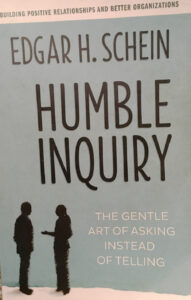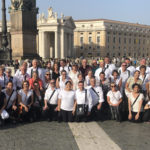(Editor’s note: During the June 17 diocesan Synodal Summit about welcoming and belonging, Dan Ebener showed two books he uses to teach a graduate course at St. Ambrose University in Davenport entitled Dialogical Skills. Several people have asked him for more information about those two books. His review of the first book appeared in our Aug. 3 issue. He reviews the second book here.)

“Humble inquiry: The Gentle Art of Asking Instead of Telling,” by Edgar Schein (2013), presents the philosophical basis for open communication that is based on humility, empathy and curiosity. The book also offers a model for humble conversations, which can be a practical tool for parish leadership, as well as a form of pre-evangelization because it builds trust in the relationship.
Schein suggests that we live in a culture of “do and tell,” where we try to do everything by ourselves (instead of leading others). If we do involve others, we usually tell them what to do. In a world that is rapidly changing and increasingly complex, leaders need to listen to the people who are closest to the problems we are facing. This is particularly true for adaptive problems, the ones for which there are “no easy answers” (Ronald Heifetz).
In the Church, adaptive problems can include: How can we reach the un-churched? How can we increase Mass attendance? How can we engage more parishioners in activities outside of attending Mass? How can we encourage parish volunteers to become parish leaders? How can we change the hearts and minds of our parishioners about becoming missionary disciples in an apostolic age?
Pope Francis says, “If we want to encounter and help one another, we have to dialogue” (“Fratelli Tutti,” no. 198). Dialogue is a conversation by people in relationship who are committed to searching for a deeper sense of meaning. Humble inquiry provides a means to hold authentic dialogue in the Church. For example, it can be used in parish meetings, i.e. when we start the meeting with questions and participate in a conversation instead of issuing report after report. Research shows that about 70-80% of meeting time is spent in a telling mode, where we hear reports, instead of an asking mode, where we probe deeply into an adaptive challenge.
Switching from telling to asking can change the culture of an organization, including a parish. People are more engaged in parish meetings that are interactive and where their opinions are shared in an open and honest dialogue. Humble inquiry could effectively change the culture of most parish council, finance council and parish staff meetings.
A humble conversation starts with an open-ended question. You might ask: “What are your thoughts about becoming a more welcoming parish …?” or “Tell me what you think about engaging the youth and young adults in our parish …” Open questions allow people the ability to be truly open about their thoughts and feelings. Once you ask an open question, your job is to listen.
Listen to the words and the emotions behind the words. Listening helps you to connect with others. It builds trust. It shows that you care. Listening is an investment that takes time and patience. Given the rapid pace and perpetual nature of change in the world today, most people tend to speed everything up, including conversations. Listening is a single-minded activity that ensures open, honest and effective communication.
(Dan R Ebener teaches in the Masters of Organizational Leadership program at St Ambrose University.)












